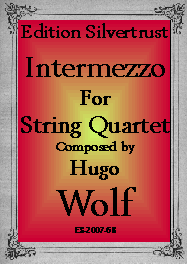Presents
Hugo Wolf
Intermezzo for String Quartet in E flat Major
 Hugo Wolf (1860-1903)
was born in what was then the Austrian town of Windischgraz. He showed an early
predilection for music and studied both piano and violin as a boy. He attended
the Vienna Conservatory but was expelled. He then continued to study composition
on his own, which was of seminal importance to his development as an
experimental composer, especially in his instrumental works. Temperamentally
unable to hold a steady position, Wolf worked for most of the rest of his life
as a critic and music teacher in Vienna. As a composer, Wolf made his name as a
composer of songs (lieder) and is generally regarded as the greatest master,
after Schubert, of this art form.
Hugo Wolf (1860-1903)
was born in what was then the Austrian town of Windischgraz. He showed an early
predilection for music and studied both piano and violin as a boy. He attended
the Vienna Conservatory but was expelled. He then continued to study composition
on his own, which was of seminal importance to his development as an
experimental composer, especially in his instrumental works. Temperamentally
unable to hold a steady position, Wolf worked for most of the rest of his life
as a critic and music teacher in Vienna. As a composer, Wolf made his name as a
composer of songs (lieder) and is generally regarded as the greatest master,
after Schubert, of this art form.
Wolf was under the spell of Wagner and became a representative of the so-called New German School which adhered to the use of the chromaticism and other innovations that were to be found in Wagner's music. He became a fierce opponent of Brahms and the old guard.
In the realm of chamber music, Wolf is known for his Italian Serenade, which was also orchestrated. A fine and evocative work which has found its way into the concert repertoire, the Serenade is really a traditional piece of music, while the Intermezzo, which dates from 1886, can almost be regarded as experimental. Although in one movement, it is a large work. Eric Sams, writing in The New Grove Dictionary of Music and Musicians, has this to say of it:
[It is a] "rondo with episodes and varied restatements all so cunningly derived from the main theme as to suggest different aspects of the same characters linked by a dialogue or colloquy with a hint of dance..."
It begins with a gorgeous melody which Wolf interrupts without warning with what must have then seemed like very jarring interludes, both from a rhythmic and tonal standpoint. This writing is far in advance of anything being written at the time. Wolf takes the listener on an incredible journey to unimagined places only in the end to return to the familiar and well-loved.
Too big for an encore, professionals could easily program this fine work where something shorter between bigger works is needed. Experienced amateurs will find it a revelation.
Parts: $19.95